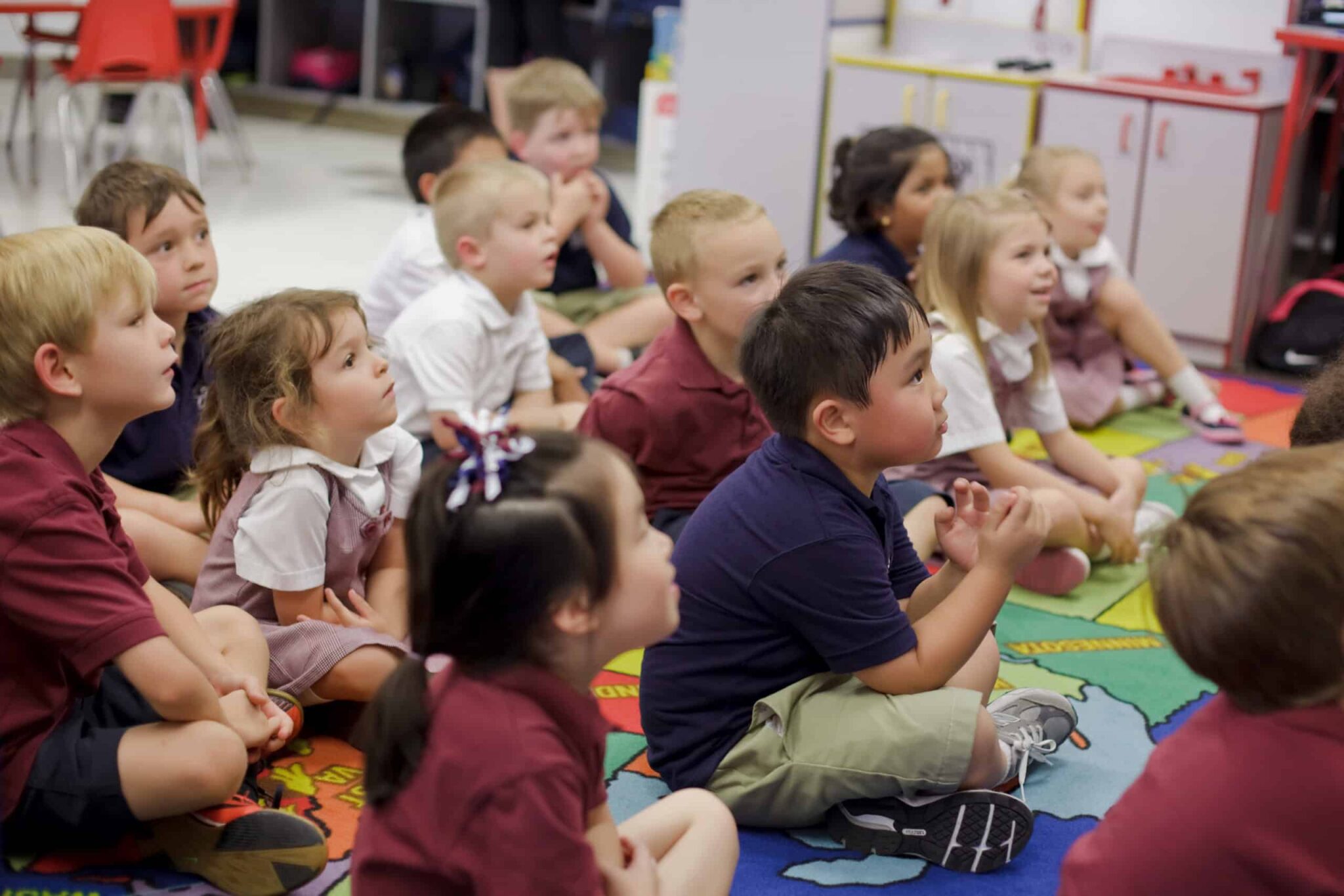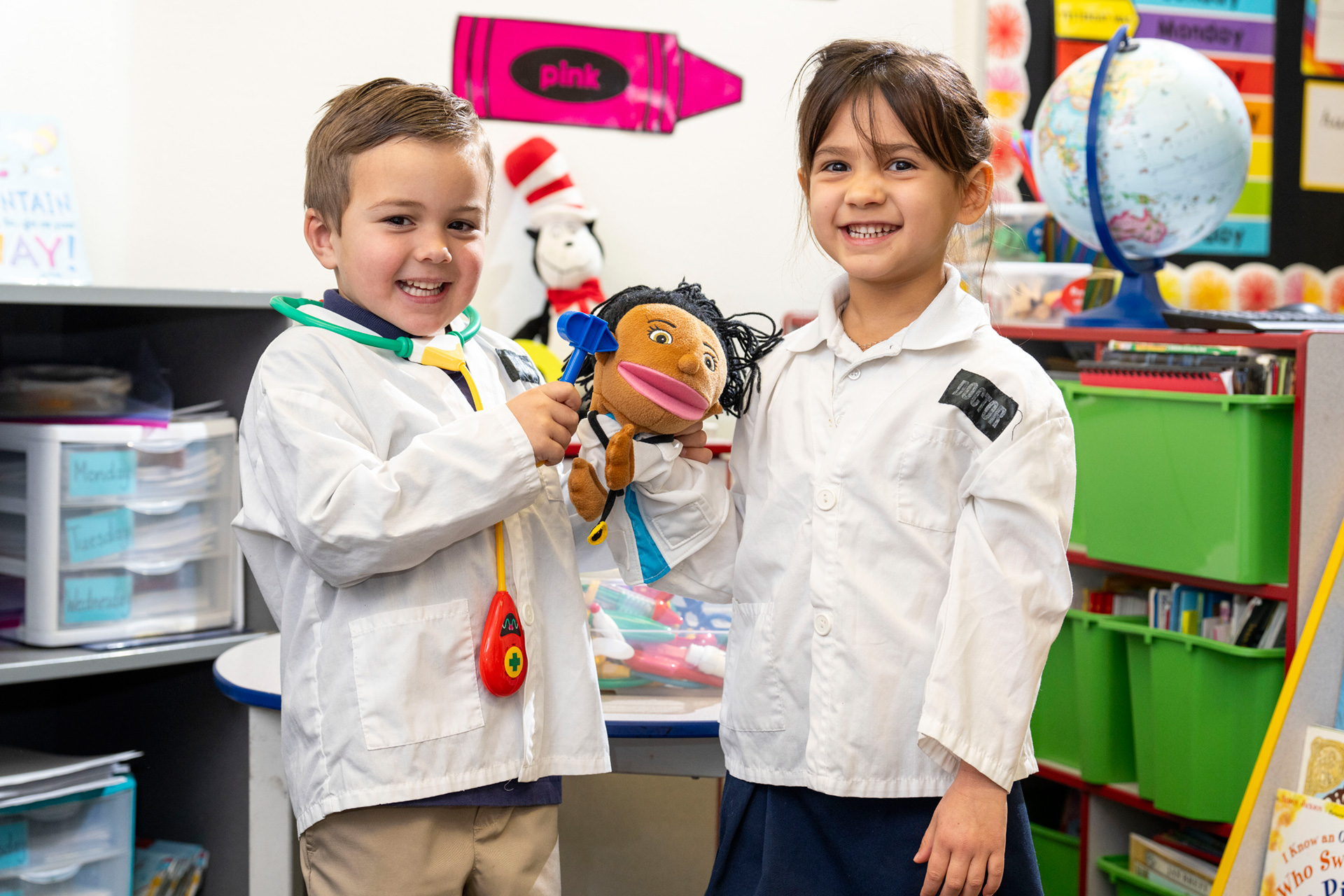Creative methods Private School programs enhance critical thinking and teamwork
Wiki Article
The Importance of Interactive Activities in Grade School Education
Interactive tasks play an essential role in grade college education. They involve pupils and boost learning results. Through team jobs and hands-on experiments, trainees experience the material in a functional way. This strategy provides to varied discovering styles and promotes crucial abilities. The benefits prolong past academics. Exploring the much deeper effect of these tasks reveals their relevance fit young learners' futures. What transformations happen when students actively take part?Enhancing Interaction With Interactive Discovering
Conventional mentor approaches have their advantages, interactive understanding significantly boosts pupil involvement in grade institution education and learning. This strategy encourages active participation, allowing trainees to immerse themselves in the understanding procedure. By using group tasks, hands-on experiments, and technology-driven sources, teachers develop a setting where pupils really feel much more attached to the product.Interactive learning facilitates partnership amongst peers, cultivating communication skills and synergy. It additionally accommodates varied understanding styles, guaranteeing that aesthetic, acoustic, and kinesthetic students can all prosper. Furthermore, students are more probable to retain information when they proactively participate, instead of passively obtaining understanding.
This vibrant method not just makes discovering satisfying however likewise infuses a feeling of possession in pupils concerning their academic trip. As they engage with the material, their inquisitiveness and inspiration to discover rise, laying a solid structure for future academic success.
Creating Critical Assuming Skills
Interactive learning not just enhances involvement however additionally acts as a driver for creating important assuming abilities in grade institution students. Via activities such as problem-based understanding, discussions, and hands-on experiments, pupils are urged to analyze details, assess different perspectives, and formulate reasoned verdicts. These interactive experiences need students to doubt assumptions, leading them to assume more deeply regarding numerous topics.
Furthermore, interactive activities frequently present real-world scenarios that challenge students to apply their expertise artistically. By maneuvering via these difficulties, they discover to recognize relevant details and make informed choices. This process cultivates not only private important reasoning however likewise motivates pupils to express their assumed processes, boosting their ability to communicate effectively. Consequently, interactive learning atmospheres cultivate a generation of critical thinkers that are much better prepared to deal with intricate issues in their future scholastic and specialist undertakings.
Fostering Cooperation Among Peers
Fostering cooperation amongst peers is important in elementary school education and learning, as it enhances team effort and interaction abilities. Taking part in team tasks assists pupils construct count on and regard for each other, preparing for effective collaboration. Problem-solving with each other enables trainees to discover from each other and establish a collective method to obstacles.Team Effort and Communication Skills
Effective synergy and interaction abilities are necessary parts of a successful elementary school education. Taking part in interactive activities urges students to team up, share concepts, and solve issues with each other. Such experiences promote the development of important interaction abilities, permitting kids to share their ideas plainly and listen proactively to others. Via synergy, students discover to appreciate diverse perspectives, promoting a feeling of area and shared responsibility. Structured team jobs, whether in academics or innovative tasks, enhance peer interactions, showing kids how to work out functions and deal with disputes. Consequently, these skills not just add to a positive classroom setting yet additionally prepare students for future joint endeavors in college and the work environment. On the whole, synergy and communication are fundamental to alternative advancement in elementary school.Structure Trust Fund and Regard
Structure count on and regard amongst peers functions as a foundation for effective collaboration in quality college atmospheres. They are a lot more likely to involve actively in team tasks when pupils really feel valued and respected by their classmates. Interactive tasks, such as group projects and cooperative video games, offer chances for trainees to learn from each other, cultivating a sense of area. This setting encourages open communication, enabling pupils to express their ideas and opinions without fear of judgment. As count on develops, students end up being a lot more happy to share duties and support each various other's understanding. Inevitably, growing an ambience of count on and regard enhances not only scholastic results yet likewise social development, outfitting students with vital social skills for their future ventures.Problem-Solving Together
Joint analytical involves pupils in vital reasoning and synergy, essential abilities for their scholastic and individual development. When students interact to deal with difficulties, they learn to interact effectively, regard diverse point of views, and utilize each various other's toughness. This process boosts their capability to assess troubles from numerous angles and establish innovative services. Group tasks, such as scientific research experiments or mathematics challenges, promote energetic engagement and promote a sense of area. As students collaborate, they likewise develop social skills, finding out to negotiate and compromise, which are important for future interactions. Eventually, problem-solving with each other grows a supportive knowing setting, encouraging pupils to take possession of their education while preparing them for collective endeavors past the classroom.Encouraging Creativity and Advancement
Motivating creative thinking and technology in elementary school education and learning can be substantially improved with hands-on learning experiences. These tasks enable trainees to involve directly with principles and products, cultivating imaginative thinking. Furthermore, joint group projects can stimulate varied ideas and options, even more supporting an innovative environment.Hands-On Learning Knowledge
A wide variety of hands-on learning experiences greatly improves creativity and advancement in grade college education. Engaging students in functional tasks allows them to apply academic knowledge in real-world contexts, cultivating deeper understanding. By adjusting materials and tools, kids create vital problem-solving abilities and find out to think outside the box. These experiences influence inquisitiveness and motivate trainees to discover their passions even more. In addition, hands-on activities can link numerous subjects, linking scientific research, art, and math in purposeful ways. This interdisciplinary strategy urges trainees to see connections and think creatively. Eventually, hands-on knowing experiences support a generation of innovators, equipping them with the skills and self-confidence required to take on future challenges and contribute to society in special means.Collaborative Group Projects
Hands-on discovering experiences normally lead to the unification of joint team tasks, which play an essential duty in promoting creative thinking and advancement in elementary school education. These projects motivate trainees to collaborate, sharing concepts and point of views, which enhances problem-solving abilities and essential thinking. Through collaboration, pupils find out to interact effectively and regard diverse point of views, essential abilities for their future. Additionally, team tasks supply opportunities for pupils to experiment with different duties, boosting their adaptability and confidence. Taking part in this cooperative atmosphere permits them to discover their imagination, pressing the boundaries of traditional learning. Inevitably, collaborative group projects not only enhance the educational experience however likewise prepare trainees for real-world obstacles that need teamwork and innovative thinking.Structure Confidence and Freedom
As trainees engage in interactive activities, they commonly find possibilities to build confidence and freedom. These activities, whether they entail hands-on projects, role-playing, or analytical tasks, motivate pupils to take initiative and reveal their concepts freely. By Private Grade School Peoria taking part in such experiences, pupils learn to trust their capabilities and make decisions without relying only on assistance from peers or educators.Interactive activities foster a feeling of possession over learning. They develop critical believing abilities and strength when pupils deal with difficulties collaboratively or separately. This procedure not only improves their understanding of the subject matter but also equips them to take threats in their learning trip.
As they navigate various interactive situations, pupils slowly dropped their self-doubt, paving the way for enhanced self-confidence - Private Grade School Peoria. Inevitably, these tasks play a vital function in supporting certain and independent students, outfitted to encounter future scholastic and individual difficulties
Creating a Favorable Class Setting
While promoting a positive classroom setting is vital for effective knowing, it needs intentional initiative from teachers to produce a room where pupils really feel secure, highly regarded, and involved. A positive atmosphere urges cooperation, allowing pupils to reveal themselves without anxiety of judgment.Educators can attain this by establishing clear assumptions, advertising common regard, and acknowledging individual payments. Integrating interactive activities even more boosts interaction, making discovering more satisfying and vibrant.
Furthermore, a nurturing setting sustains social-emotional advancement, as trainees discover to browse connections and fix problems. Teachers play an important duty in modeling favorable behavior and strengthening a society of kindness and inclusivity.
Frequently Asked Questions

How Can Moms And Dads Support Interactive Learning at Home?
Parents can sustain interactive understanding in your home by giving engaging materials, encouraging hands-on tasks, incorporating instructional video games, promoting discussions, and developing a nurturing setting that advertises inquisitiveness and expedition in their children's finding out experiences. (Kindergarten)What Sorts Of Interactive Tasks Are Most Effective?
Hands-on tasks, collaborative games, role-playing circumstances, and educational innovation applications are among one of the most efficient interactive activities. These involve pupils, enhance crucial assuming abilities, and promote synergy, eventually promoting a much deeper understanding of different topics.Just How Do Interactive Activities Satisfy Various Understanding Styles?
Interactive tasks engage aesthetic, auditory, and kinesthetic learners by incorporating varied approaches. These activities promote understanding through hands-on experiences, joint conversations, and aesthetic aids, allowing students to take in info according to their favored discovering style.What Are the Expenses Related To Implementing Interactive Tasks?

Applying interactive tasks sustains costs such as materials, training for educators, technology upgrades, and potential facility alterations. Budget restraints can also influence the frequency and variety of activities offered to students in educational settings.
How Can Teachers Assess the Effect of Interactive Knowing?
Educators can analyze the effect of interactive learning with monitorings, trainee responses, performance metrics, and relative analysis of test ratings before and after application, ensuring a complete understanding of engagement and knowledge retention improvements.Via activities such as problem-based understanding, debates, and hands-on experiments, trainees are motivated to analyze details, evaluate different point of views, and formulate reasoned final thoughts. Interactive activities usually present real-world situations that test pupils to apply their knowledge creatively. Involving in interactive activities motivates students to collaborate, share ideas, and resolve issues together. Interactive tasks, such as team tasks and cooperative video games, provide opportunities for students to learn from one another, promoting a sense of area. As students engage in interactive activities, they typically find possibilities to build confidence and independence.
Report this wiki page